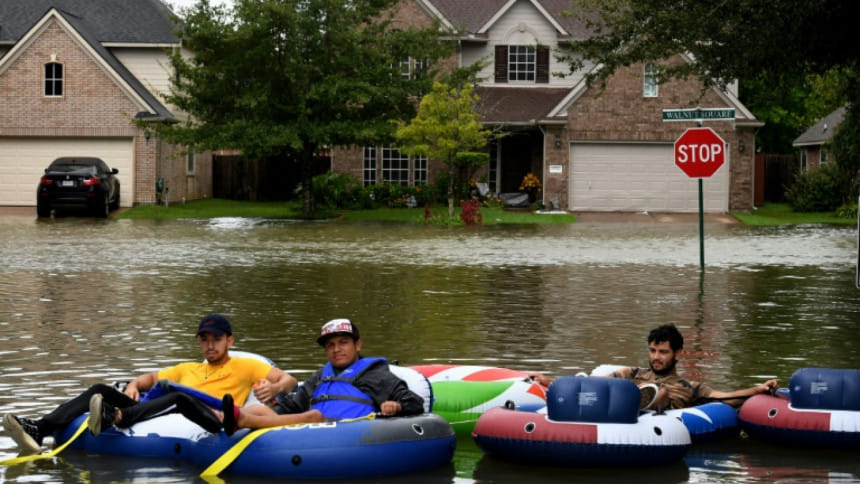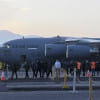Harvey floodwaters climb as Texas rescuers scramble to find survivors

Rescuers in Texas were racing against time Wednesday to find survivors of Harvey's wrath and take them to safety, with Houston's mayor declaring a nighttime curfew to head off looting as rains persisted and the raging floodwaters continued to rise.
Five days after the monster storm slammed onshore as a Category Four hurricane, turning roads into rivers and neighborhoods into lakes in America's fourth-largest city, emergency crews were still struggling to reach hundreds of stranded people in a massive round-the-clock rescue operation.
The curfew declared by Houston Mayor Sylvester Turner went into effect at 10:00 pm (0300 GMT) and was to last until 5:00am (1000 GMT), to aid search efforts and thwart potential looting in the flood-ravaged city.
At least one bridge had crumbled, one levee had breached and dams were at risk in the Lone Star State, where Harvey, now a tropical storm, has so far driven more than 8,000 people into emergency shelters.
The full scale of the catastrophe's impact -- including the number of deaths and the extent of destruction -- remained difficult for authorities to gauge, as rescue efforts were ongoing and the storm was expected to strike once more.
With neighboring Louisiana squarely in the path of a storm now hovering off the Gulf Coast, Harvey is pressing northeastward and expected to make landfall again early Wednesday.
Residents of low-lying New Orleans -- which bore the brunt of Katrina's devastation in 2005 -- are bracing for up to 10 inches (25 centimeters) of rain over the next 36 hours, with a risk of flash floods.
US media reports indicated the death toll could have risen to 30, and authorities feared confirming more once the worst had past and search teams could again travel roads.
A Houston police officer was confirmed the latest victim of the storm after the body of Steve Perez, who went missing after reporting for duty in the early hours of Sunday, was recovered by divers two days later.
Harvey was previously known to have left at least three people dead, with six more fatalities potentially tied to the storm.
'Overwhelming'
Everywhere, the figures from the storm are staggering. The National Weather Service said over six million Texans have been impacted by 30 inches or more of rain since Friday.
Residents living around a chemical plant in the county that includes Houston were evacuated as a precaution, over fears that some of the chemicals at the facility -- which produces organic peroxides -- might react or cause an explosion.
The NASA space flight center in Houston said it was closing until Monday because of the storm.
Andrea Aviles, 16, fled her home along with her family on Tuesday. She and some 30 extended family members were now crammed into a hotel in the small town of Winnie.
"I've never seen it like this," she said of the flooding. "All our yard is full of water."
Hugging the road's central median in their Suburban vehicle -- water reaching halfway up the tires -- they passed ditches full of abandoned cars.
"It was sad," she said. "It's overwhelming."
Trump visits
President Donald Trump toured the Harvey disaster zone in Texas on Tuesday as he sought to project an image of leadership in America's first major natural disaster since he took office.
On Air Force One bringing Trump back to Washington, White House spokeswoman Sarah Huckabee Sanders said the president will return to Texas Saturday and perhaps go to Louisiana, too, depending on the weather there.
Trump visited the coastal city of Corpus Christi, praising the work of state and federal officials in responding to the disaster.
"It's historic, its epic, but I tell you, it happened in Texas -- and Texas can handle anything," he told a mix of supporters and banner-waving protestors after a briefing held inside a fire station.
The US leader and First Lady Melania avoided visiting Houston -- swathes of which remain under water -- to avoid disrupting recovery efforts.
But the president was nevertheless seeking to make a political statement, learning from the mistakes of former Republican leader George W. Bush, whose response to Hurricane Katrina -- which walloped New Orleans exactly 12 years ago -- was widely seen as botched.
"It is really sort of a wild card right now," meteorologist Eric Holthaus told AFP of the outlook for New Orleans.
The farthest reaching rain bands have already dumped as much as six inches of water in parts of the city famous for its jazz music and Cajun cuisine.
'Long way to go'
The National Weather Service tweeted Harvey appears to have broken a US record for most rain from a single tropical cyclone, with nearly 52 inches (132 centimeters) recorded in the town of Cedar Bayou.
The Texas bayou and coastal prairie rapidly flooded after Harvey struck the coast on Friday, but the region's sprawling cities where drainage is slower were worst hit.
Highways were swamped and homes were rendered uninhabitable, with power lines cut and dams overflowing, sparking massive floods across Houston -- a city of 2.3 million people -- and its wider metropolitan area of six million.
The National Hurricane Center said Harvey is expected to dump an additional six to 12 inches of rain to the north and east of Houston from far east Texas into southwestern Louisiana.
Federal officials estimate up to half a million people in Texas will ultimately require some form of assistance -- but for now the focus remains immediate disaster relief, with many lives still at stake.
"Recovery is a slow process," Brock Long, the head of the Federal Emergency Management Agency, said as he welcomed Trump in Corpus Christi along with Texas Governor Greg Abbott.
"We've got a long way to go."

 For all latest news, follow The Daily Star's Google News channel.
For all latest news, follow The Daily Star's Google News channel. 








Comments